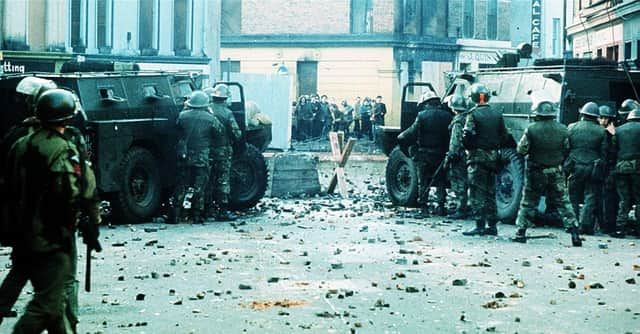Decisions not to pursue Bloody Sunday murder charges are legally ‘unimpeachable’, court hears


Counsel for the Public Prosecution Service (PPS) insisted the authority had properly considered the evidential test and likely outcome of any criminal process over the shootings in Derry in 1972.
Tony McGleenan QC also claimed the authority would be abdicating its responsibilities by bringing to trial cases regarded as having no realistic prospect of securing convictions.
Advertisement
Hide AdAdvertisement
Hide AdThirteen people were shot dead when members of the Parachute Regiment opened fire on civil rights demonstrators in the city’s Bogside on January 30, 1972. Another man died later.
In 2010, the Saville Inquiry into the events on Bloody Sunday established the innocence of all of those who died.
Relatives of seven of the victims are seeking a judicial review of decisions which mean five of the ex-paratroopers will not face trial.
In July, the PPS announced it was dropping charges against Soldier F for the murders of William McKinney (26) and James Wray (22), plus five counts of attempted murder.
Advertisement
Hide AdAdvertisement
Hide AdThe case against him was reviewed after criminal proceedings against two other military veterans for Troubles-era offences collapsed in Belfast earlier this year.
Based on an assessment of the admissibility of evidence from the time, it was concluded that the test for prosecution was no longer met.
The PPS is also being challenged for not charging former paratroopers with the murders of Jackie Duddy (17), Michael Kelly (17), John Young (17) Michael McDaid (20) and 41-year-old father-of-six Bernard McGuigan.
The case involves a dispute about whether statements taken from soldiers in 1972 would be ruled inadmissible in any criminal trial.
Advertisement
Hide AdAdvertisement
Hide AdLawyers for the families contend the prosecuting authority’s assessment of the evidence is legally and fundamentally flawed.
But, highlighting the code for prosecutors, Mr McGleenan rejected claims that cases should be brought to trial even when they decided the evidential test was not met.
“That is a contentious submission which involves an abdication of the responsibilities of the Public Prosecution Service, not their discharge,” he said.
He told the court the case involved “borderline judgments and acute difficulty”.
Advertisement
Hide AdAdvertisement
Hide AdSenior counsel in Northern Ireland, England and Wales, and a former First Treasury Counsel all advised on the merits of prosecution, the court heard.
According to Mr McGleean, likely defence arguments at a criminal trial were also predicted.
“It is about anticipating how this will fare in the Crown Court, when faced with specialist criminal counsel who will, in the vernacular, know all the moves,” he said.
During submissions, he stressed the challenge featured no allegations of bad faith or any breach of the code for prosecutors.
Advertisement
Hide AdAdvertisement
Hide AdAny potential error of law would be limited to a “tangential point” which would make no significant difference, it was claimed.
Mr McGleenan stressed: “We are analysing the reasonableness of the forecast made by the prosecutor.
“If it is within a reasonable range of forecasts of what the Crown Court will do, in terms of a conviction, then it is unimpeachable, even if there is some peripheral error.”
The hearing continues.